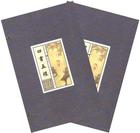
Four Books - came into existence before
Qin Dynasty, although they were not called "Four Book" at that moment. The Analects
of Confucius, one of the Four Books, is a collection of words and indeed
of Confucius. The other three are Mencius, The Great Study and The
Doctrines of the Mean. Mencius recorded the political thought of
master Meng Ke (Mengzi) who was another prominent figure of Confucianism. The Great
Study and The Doctrine of the Mean are two chapters from the core
of The Records of Rites originally. They are the collection of treatises
on the rules of propriety and ceremonial usage. Zhu Xi, the well-known scholar of
the Southern Song Dynasties, offered elaborate comments on the two books. Together
with The Analects of Confucius and Mencius, they were called The Collected
Notes on Passages in the Four Books, commonly known as "Four Books". They
were regarded as the elementary textbooks for Confucianism study. Five Classics
refer to five ancient classics: The Book of Changes, The Book of Documents,
The Book of Rites and The Spring and Autumn Annuals.
In the dynasties of Ming and Qing, the sentence from "Four Books and Five Classics"
were the basis for the Imperial Examinations. Examinees had to explain them according
to The Collected Notes on Passage in the Four Books. Therefore, "Four Books
and Five Classics" became the most important textbooks for scholars of the time.
Then the Confucius thought of "Four Books and Five Classics" became the guideline
of human behavior. Further more, as the most important ancient corpus of China,
it still has great influence on the current generation.
Previous Next

